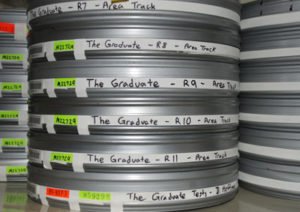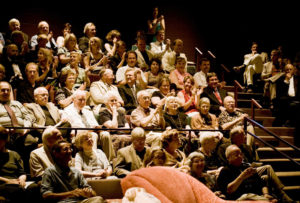by Brandt Roberts (Commonweal Resident Ensemble Member)
 Once upon a time, there were theatres and opera houses in nearly every small community in this wide country of ours. Vaudeville shows, symphonies, magic acts, acrobats, circuses and touring companies gave the teeming masses a balm to contend with life’s travails. Live entertainment was the rage and had been for centuries. These performances gave men and women an escape, an entrance into the world of their imagination where they could view humanity in its heightened form: distilled to its essence.
Once upon a time, there were theatres and opera houses in nearly every small community in this wide country of ours. Vaudeville shows, symphonies, magic acts, acrobats, circuses and touring companies gave the teeming masses a balm to contend with life’s travails. Live entertainment was the rage and had been for centuries. These performances gave men and women an escape, an entrance into the world of their imagination where they could view humanity in its heightened form: distilled to its essence.
But those days came to an end. Thomas Edison invented a way to capture life in celluloid. No more would a performance exist solely on the stage. Now stories could be confined to film for the world to see at its leisure. It became cheaper to ship cans of celluloid than to ship train cars of actors. And so the live performance halls were converted into cinemas.
 It was the age of Hollywood. Movie stars graced the silver screen and millions of viewers across the country idolized these monochromatic giants. Edison’s little contraption had unwittingly changed the face of theatre. No more could plays be performed as naturally or realistically as the public demanded. Film was able to capture the real world far better than any stage set. The audience had become accustomed to their new viewfinder world.
It was the age of Hollywood. Movie stars graced the silver screen and millions of viewers across the country idolized these monochromatic giants. Edison’s little contraption had unwittingly changed the face of theatre. No more could plays be performed as naturally or realistically as the public demanded. Film was able to capture the real world far better than any stage set. The audience had become accustomed to their new viewfinder world.
So the stage was set for Avant-garde, Surrealism, Absurdism, and many other “isms.” Theatre became an experimental playground, more so than it had ever been in its three thousand year history. It had to reinvent itself.
Over the years, people have professed to me that theatre is dying—from within the profession and from without. With the advent of film, television, radio, YouTube, iPhones and the like, how does the modest theatrical performance stand a chance in our world of mass media? The answer—easily. Within the phrase “theatre is dying,” there is the implication that it is something that is alive, something that can die. Film, on the other hand, is already “lifeless.” Trapped within celluloid, the film La Voyage Dans La Lune will be the same today as when it was released in 1902; only the audience has changed. When people say that theatre is dying, they are referring to popularity and not vital signs. But is theatre truly out of fashion?
In the southern region of America, there does seem to be a decline. A few years ago, I toured the northern part of our country with a theatre company. Within these small towns in the north, old vaudeville houses and single screen cinemas, which were closed due to the onslaught of multiplex theatres, had been renovated into live performance spaces. So why not renovate old theatres in the south? Well, the demographic in the south has a hard time supporting a theatre because generally speaking, they are not live theatregoers. Some of this has to do with income. A lot of the areas in the north that have renovated theatres also have a wealthy demographic with a philanthropic soft spot for the arts.
 So why do we need theatre? We have film, TV and the Internet. And besides, theatre isn’t financially practical. We need it for one very strong reason: human beings are social creatures. We thrive on human interaction. If a baby is raised in isolation it will develop severe social and mental disabilities. The same can be said of an isolated society. Besides the audience breathing together, you have the actors on stage breathing with each other, but also breathing with the audience. The audience affects the action on stage. They are active participants in the experience, not passive bystanders. They are not isolated but intimate.
So why do we need theatre? We have film, TV and the Internet. And besides, theatre isn’t financially practical. We need it for one very strong reason: human beings are social creatures. We thrive on human interaction. If a baby is raised in isolation it will develop severe social and mental disabilities. The same can be said of an isolated society. Besides the audience breathing together, you have the actors on stage breathing with each other, but also breathing with the audience. The audience affects the action on stage. They are active participants in the experience, not passive bystanders. They are not isolated but intimate.
When you have a conversation with someone, you want that person to respond to you. Think about live performances as a conversation. It is an organic experience. The performance you see will never be seen again! Differences in the actors, audience, temperature, weather, politics and region all have an effect on the product. It is alive. A performance is born and dies every single night.
So, why do we need theatre in a small town? Because the residents of an area know what stories need to be told to their community. No one else will tell the tales that need to be told. It is a theatre’s job to build worlds that are only open to a few. Isn’t it great to share a once-in-a-lifetime opportunity with other people in your community?

Brandt Roberts
Arts foster this in our children and our children’s children. Art is the foundation of a successful culture and as long as there are humans who will listen to a story, there will be theatre. Theatre doesn’t need a set or a stage, elaborate lighting or costumes. It doesn’t need a camera, electricity, a computer or a satellite. It just needs a storyteller and an audience. The only difference between a story and a play is when the storyteller becomes a character. It is odd to admit it, but we all act. Each and every day you play a different character: a wife/husband, a carpenter, a teacher, a father/mother, a child, a doctor, an athlete and a lawyer… the list is infinite. You may say these are just social roles, but do you not behave differently depending upon these roles? And are not the characters in a play called “roles” for a reason? As Sir Laurence Olivier said, “Surely we have always acted; it is an instinct inherent in all of us. Some of us are better at it than others, but we all do it.”
Theatre cannot die. It is a part of who we are.




YES! Theater is a part of me and you and you! That is why the Commonweal is family…a part of the fabric of a town…an extended outreach to all the communities touched when the power of a story is shared again and again and yet again. What an eloquent way to express this living, breathing art! Thanks Brandt, for sharing these thoughts and breathing with me!
Thank you for all that you do to enrich our community!